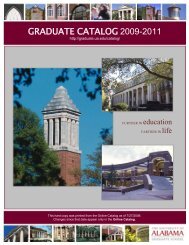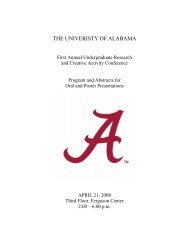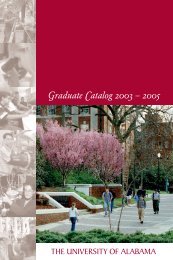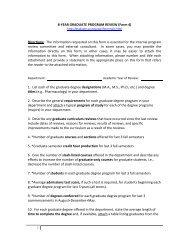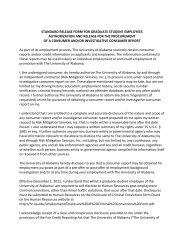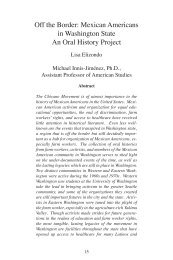Letters from a Planter's Daughter: Understanding Freedom and ...
Letters from a Planter's Daughter: Understanding Freedom and ...
Letters from a Planter's Daughter: Understanding Freedom and ...
Create successful ePaper yourself
Turn your PDF publications into a flip-book with our unique Google optimized e-Paper software.
161<br />
<strong>Letters</strong> <strong>from</strong> a Planter’s <strong>Daughter</strong><br />
write her Uncle Thomas in 1890 saying how “mama speaks of you so often,”<br />
<strong>and</strong> “mama sends her love to you,” <strong>and</strong> “mama have told me so much<br />
about you,” <strong>and</strong> “mama says you named me”—<strong>and</strong> that if he would like to<br />
send a gift to her, she would be pleased with anything “so long as you send<br />
me something.” 61 Thomas was to the next generation what Cabaniss was<br />
to his: a benefactor <strong>and</strong> moral authority whose influence extended <strong>from</strong><br />
Huntsville to the Kansas <strong>and</strong> Ohio Townsends.<br />
In this interpretation, Thomas Townsend embodied the ideology that<br />
R.S. Rust’s Wilberforce administration emphasized: the creation of a<br />
chaste, sober, disciplined class of “elite blacks.” 62 The Townsends had a<br />
certain cachet in a cultural context that popularly held that mixed-race African-Americans<br />
possessed greater intellect than “pure” Africans. 63 Mixing<br />
mattered, even as miscegenation was abhorred. Education <strong>and</strong> literacy<br />
only helped to raise the Townsend children’s status—so long as they, as<br />
Thomas seems to have, adopted the ethos of a white, Protestant middleclass<br />
that drew a strict divide between “decent” <strong>and</strong> “indecent” behavior. 64<br />
It is unclear whether Susanna bought into this br<strong>and</strong> of racial uplift; hers<br />
may have been a more individualistic interpretation of freedom.<br />
For the duration of the war, Parthenia <strong>and</strong> Susanna experienced freedom<br />
as independence—but an independence fraught with insecurity. Wilberforce<br />
University closed after the outbreak of war in 1861, turning out its<br />
students <strong>and</strong> throwing the Townsend children to their separate fates. Willis<br />
worked as a waiter on a steamboat running up <strong>and</strong> down the Ohio River;<br />
Osborne joined a Union army heavy artillery regiment; Bradford remained<br />
in Xenia waiting for the campus to reopen, but died before 1863; Milcha<br />
rejoined “the Kansasees,” as did Thomas. Only Susanna <strong>and</strong> Parthenia<br />
remained in Ohio <strong>and</strong> moved in with Wesley <strong>and</strong> his second wife, who<br />
were at the time living just outside Cincinnati. 65 Most likely, the girls had<br />
no other options. By this time, Wesley was almost universally mistrusted<br />
by his family—after leaving his wife Jane for an Ohio woman named Adelaide,<br />
Wesley fled Kansas for Cincinnati, taking with him Jane’s <strong>and</strong> his<br />
mother’s inheritance <strong>from</strong> the Samuel Townsend estate. But when Wesley<br />
61 Carrie Leontee Townsend to Thomas Townsend, letter dated 19 August 1890.<br />
62 Hunter, To ‘Joy My <strong>Freedom</strong>, 178.<br />
63 Martha Hodes, “Fractions <strong>and</strong> Fictions in the United States Census of 1890,” Haunted<br />
by Empire: Geographies of Intimacy in North American History, Ann Laura Stoler ed.<br />
(Durham, North Carolina: Duke University Press, 2006), 247.<br />
64 Ibid, 166.<br />
65 Letter <strong>from</strong> Wesley Townsend to S.D. Cabaniss, dated 13 October 1865.



